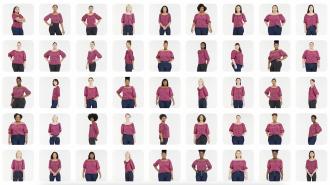Google has unveiled an AI-powered virtual try-on feature that lets shoppers see what an article of clothing would look like on a wide range of models.
“Just tap products with the ‘Try On’ badge on Search and select the model that resonates most with you,” writes Lilian Rincon, Google’s senior director of product management.
The challenge: Trying on clothes before you buy them can save you from the headache of having to return a garment that looked good on the rack, but didn’t suit your body type, skin tone, or hair color once you put it on.
You can’t use a fitting room when online shopping, though. Instead, you have to imagine what a garment might look like on you based on photos of a model wearing it — and that’s not terribly useful if you and the model look nothing alike and have entirely different body types.
What’s new? Google’s new virtual try-on feature for Search gives online shoppers a chance to choose a model with a body type similar to their own, and then see what an article of clothing would look like on that model before making a purchase.
The feature is made possible by TryOnDiffusion, a generative AI that Google researchers trained to be able to analyze an image of an article of clothing and then predict how it would look on a diverse set of real models, ranging in size from XXS to 4XL, in various poses.
Looking ahead: Google isn’t the first to offer virtual try-on — Walmart has a virtual try-on feature that lets users see clothes on a model that matches their own height and size or on an uploaded photo of themselves.
Walmart’s feature can look a bit like someone just cut and pasted a garment onto a body, though, and it doesn’t seem to work with different poses — all of the models are looking straight ahead with their arms down at their sides.
Currently, Google’s virtual try-on feature is only available for women’s tops made by a handful of brands, including Anthropologie, Everlane, H&M, and LOFT, but it plans to expand the selection and add men’s tops later in 2023.
We’d love to hear from you! If you have a comment about this article or if you have a tip for a future Freethink story, please email us at tips@freethink.com.
